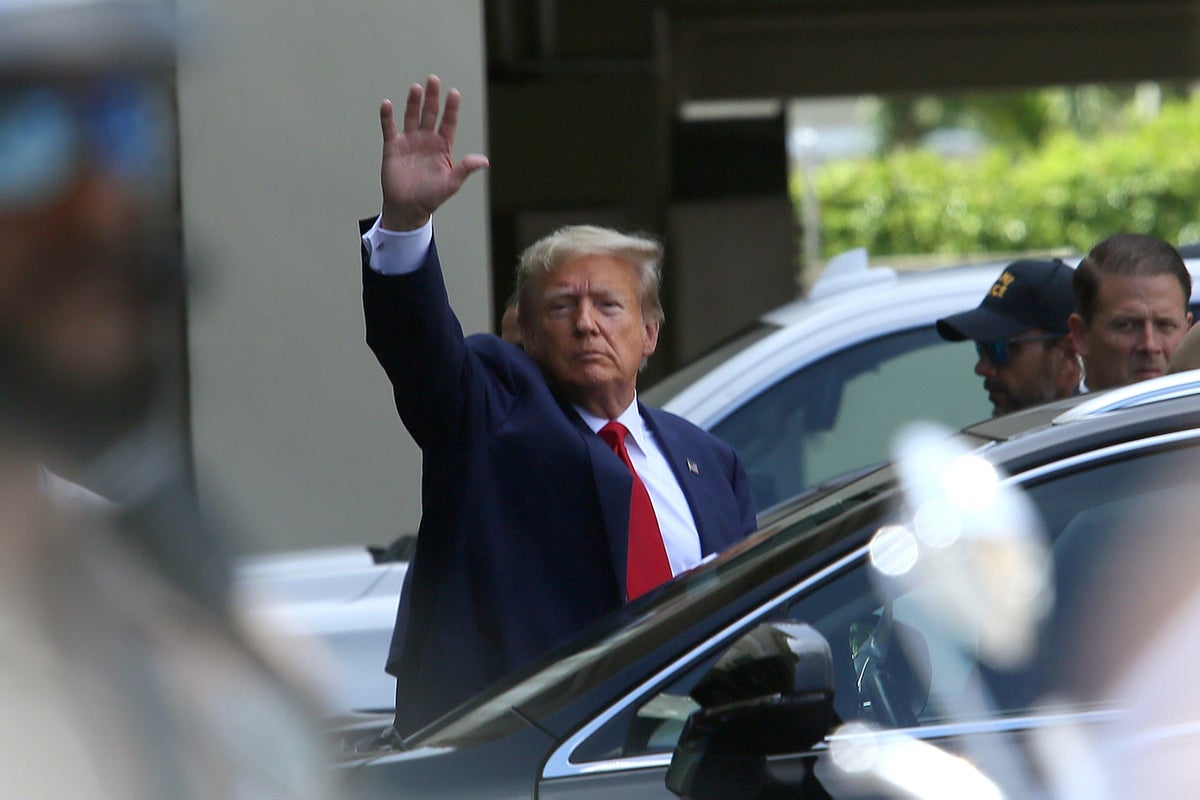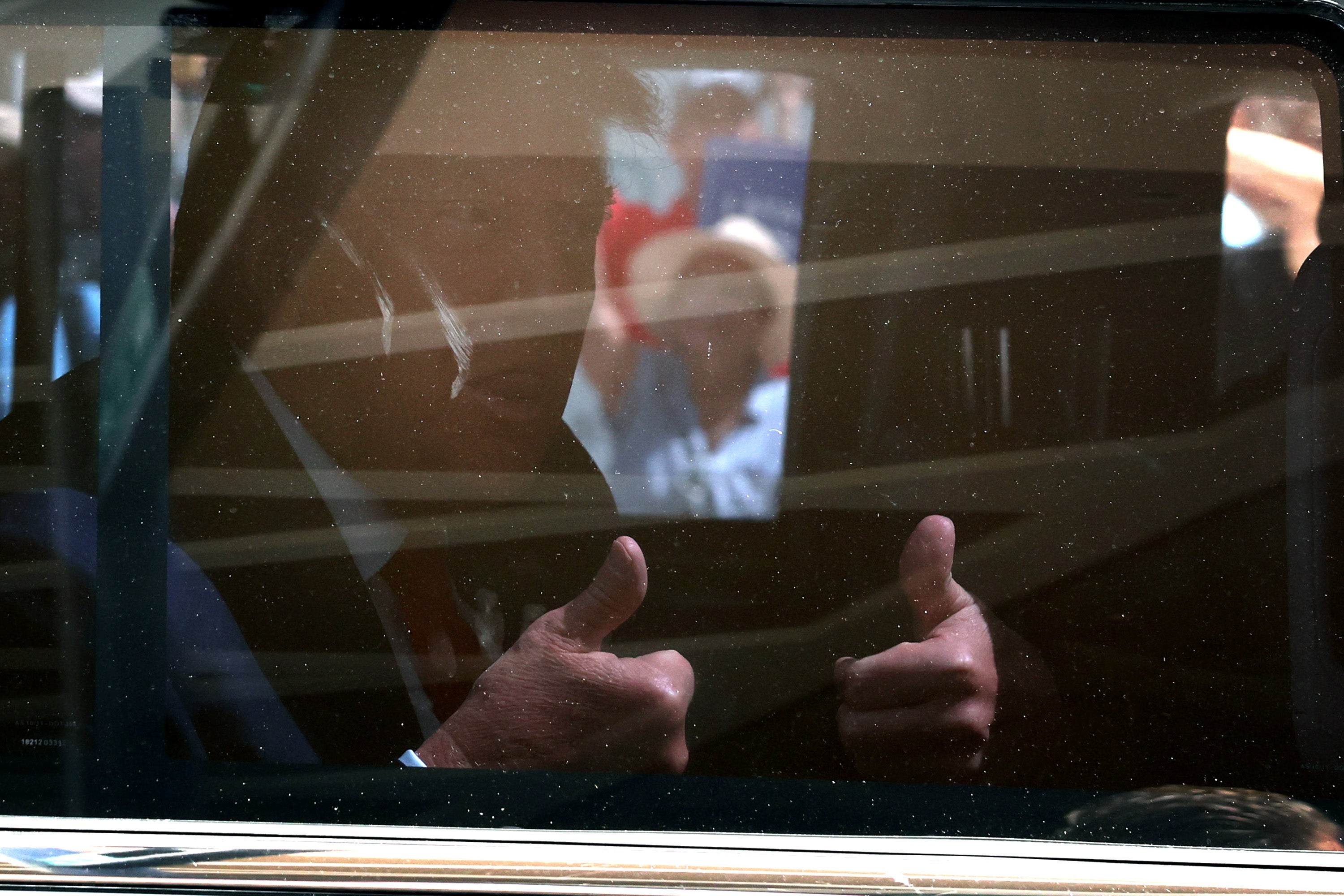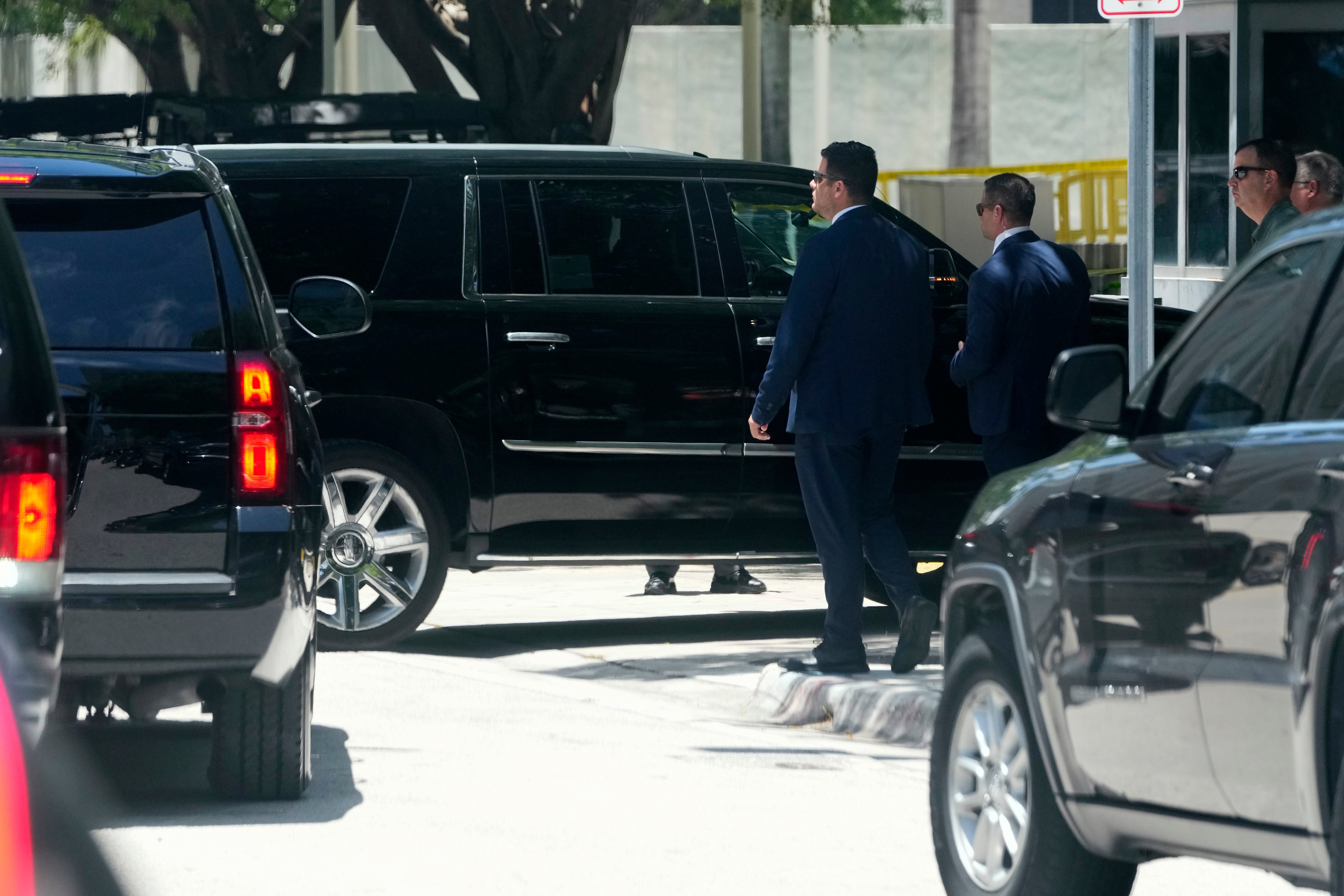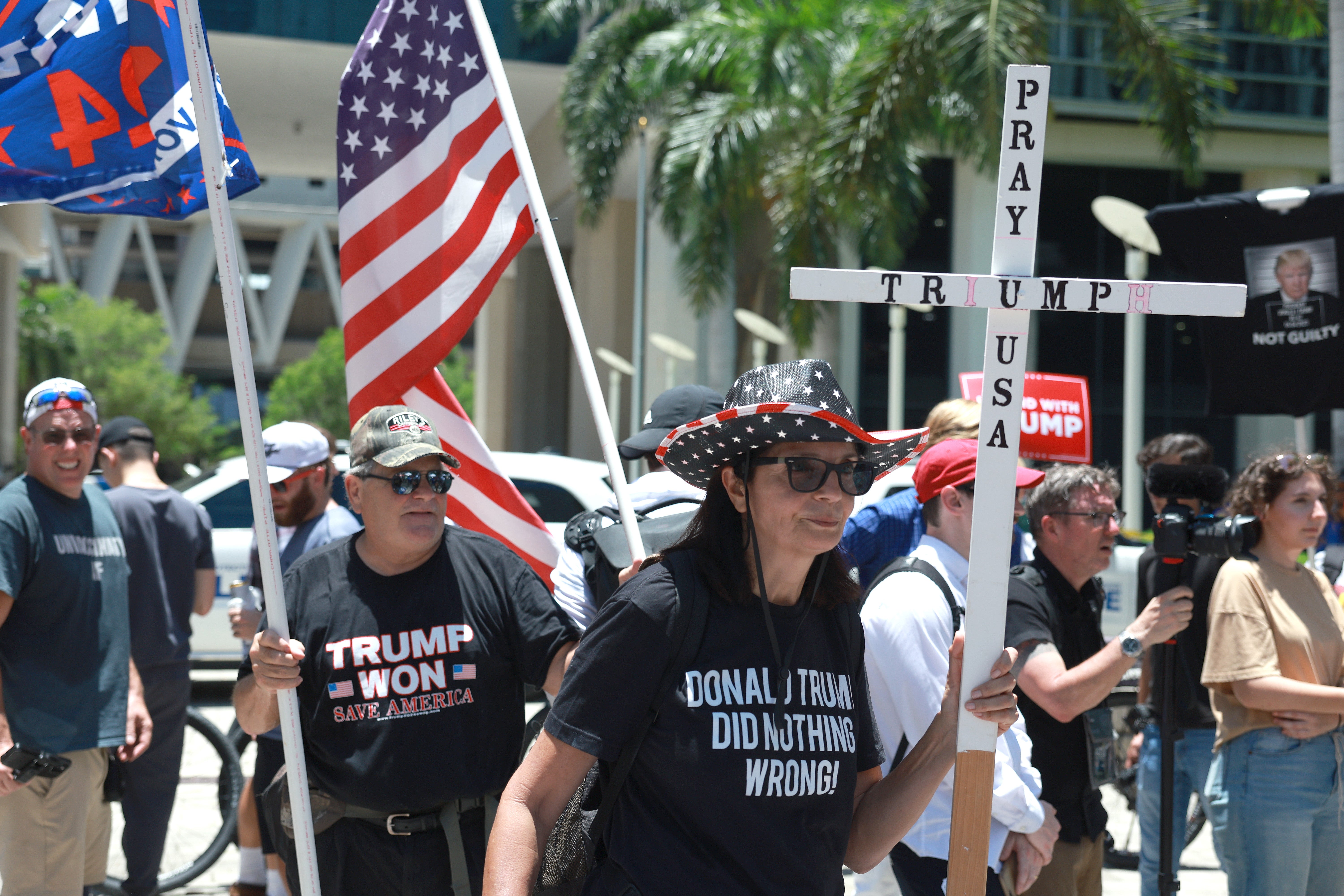
For the second time in three months, the man who served as the 45th President of the United States stood before a judge as a defendant in a criminal case that could cost his freedom for a significant portion of his remaining lifespan.
Flanked by attorneys Todd Blanche and Christopher Kise, Donald Trump entered a Miami federal courtroom as US Magistrate Judge Jonathan Goodman formally presented him with a 37-count indictment accusing the former president of illegally retaining national defense documents and other classified materials at his Florida home, and obstructing government efforts to reclaim them.
Asked to enter a plea to the charges, Mr Blanche replied on behalf of the twice-impeached and now twice-indicted former president: “We most certainly enter a plea of not guilty.”
An hour later, a former president accused of hoarding hundreds of classified documents, allegedly disclosing them to others and storing them haphazardly was out of the courthouse and visiting a restaurant in Miami, where a mob of supporters reached out to pray for him.
“Food for everyone!” he declared.
During Mr Trump’s court appearance roughly an hour prior, the magistrate did not impose any conditions of release upon the former president, save one: An order barring him from speaking with any witnesses in the case. That includes some US Secret Service agents assigned to his protective detail, as well as Walt Nauta, his co-defendant and employee. Any conversations related to their case must go through their attorneys.

Mr Trump, who sat impassively with his arms folded during the proceedings, appeared in court alongside Mr Nauta, a retired Navy chief petty officer who served as his White House valet and followed him to political exile in Florida when he left the White House in January 2021.
Mr Nauta, who was with Mr Trump as a co-defendant in the courtroom but travelled to Florida with him as a staffer, was represented by an attorney paid by Mr Trump’s political action committee, Stanley Woodward.
He did not enter a plea, as he does not have a local attorney.
The former president and Mr Nauta arrived at the Wilkie Ferguson Jr Federal Courthouse shortly before 2pm ET on 13 June after traveling with a motorcade and police motorcycle escort from the ex-president’s nearby Doral golf club.
Mr Trump was not photographed entering the court complex as he surrendered to authorities; the armoured SUV carrying the former president entered through an underground gate typically reserved as a secure entrance for vehicles transporting defendants in law enforcement custody.
Cameras, recording devices and laptops were prohibited from the courtroom, and there was no live video or photographic record of Mr Trump’s first appearance in federal court.
But outside the courthouse, the landscape was dotted with tents and shelters from news organisations that sent reporters from across the country and around the world to cover the unprecedented spectacle of a former leader of the free world being placed under arrest for the second time this year.

Not long after Mr Trump’s arrest, one of his attorneys, Alina Habba, told reporters in brief remarks that the former president remains “defiant” while condemning what Mr Trump and his allies have characterised as a “two-tiered system of justice, where selective treatment is the norm.”
“Today is not about President Donald J Trump, who is defiant,” she said. “It is about the destruction of the long-standing American principles that have set this country apart for so long.”
Ms Habba, a civil litigator from New York who entered Mr Trump’s employ not long after he left office, is not participating in his defence in either of the criminal cases that have been brought against him.
While Mr Kise, a former Florida Solicitor General, is a veteran legal practitioner in the Sunshine State, the ex-president has had difficulties securing top-tier legal representation for what is expected to be a complex case that will require an attorney with experience in sensitive national security matters.
Two of the more experienced criminal defence lawyers on his legal team, James Trusty and John Rowley, resigned from Mr Trump’s federal case last week, hours after a Florida grand jury voted to charge him with 37 separate counts stemming from alleged violations of the Espionage Act and other crimes.
Another criminal defence attorney who once represented Mr Trump in the documents probe, Evan Corcoran, stepped away from that role in the wake of a court ruling ordering him to give evidence against the former president before a grand jury and turn over his notes and recordings. A judge invoked a rarely used exception to the attorney-client privilege used in cases where an attorney’s advice is found to have been used to commit crimes.
Mr Corcoran’s testimony and evidence figured heavily in Mr Trump’s federal indictment, which detailed his reaction after he was served with a subpoena compelling him to return all documents with classification markings in his possession.
Thus far, only Mr Blanche, who represented Mr Trump in his criminal case in Manhattan, and Mr Kise, who joined the former president’s legal team after the FBI search of Mar-a-Lago last summer, are representing him in his federal case.

Mr Trump is scheduled to return to his Bedminster, New Jersey, club to deliver remarks Tuesday evening before a fundraising event.
He similarly returned to his Mar-a-Lago property hours after he appeared in Manhattan criminal court in April to face 34 felony counts of falsifying business records. In his remarks from his estate that night, he lambasted District Attorney Alvin Bragg and the judge overseeing the case, as well as the judge’s family members, and continued his narrative of political persecution.
Both cases are separate from the US Department of Justice probe into Mr Trump’s role in the events surrounding January 6 and a Georgia prosecutor’s investigation into his attempts to subvert the outcome of the 2020 election in that state, among mounting legal challenges facing the former president as he seeks the 2024 Republican nomination for another shot at the White House.
US District Judge Aileen Cannon – who was appointed by the former president in 2020 and previously ruled in his legal team’s favour in a series of court decisions surrounding the investigation – will oversee his Florida case.
Last year, she appointed a “special master” to review materials seized by federal law enforcement and restricted the FBI from using those documents as part of the investigation until she completed a review, effectively freezing the Justice Department probe.
That order was ultimately thrown out entirely by a federal appeals court, which roundly criticised her decision.
If she does not recuse herself from the case and she remains a trial judge, she could play a potentially critical role in the case’s development, from setting a trial date to overseeing jury selection, the admission of certain evidence, and sentencing, if there is a conviction.
The district is known as a “rocket docket” court, where judges adhere to a speedy trial schedule that processes cases to trial within 70 days.
Special counsel Jack Smith – who was tapped by US Attorney General Merrick Garland to handle the federal investigations into the former president – also has stated that prosecutors will push for a speedy trial “consistent with the public interest and the rights of the accused,” he said during brief public remarks announcing the indictment last week.
Mr Trump remains the frontrunner for the 2024 Republican nomination for president, and he has insisted that he will remain in the race regardless of any outcome in the criminal cases against him. He also has relied on the investigations, indictments and news coverage to raise money for his campaign, which netted millions of dollars in the days after his charges were announced in his New York case.
But the timeframe for the federal case – and, potentially, other pending cases that could result in criminal charges this year – could complicate his campaign ambitions.
A first debate among Republican candidates is set for 23 August. A trial for the New York attorney general lawsuit targeting Mr Trump, his adult children and his business is slated to begin in October. And he is scheduled to return to Manhattan Criminal Court on 25 March – days after voting begins in primary states.







